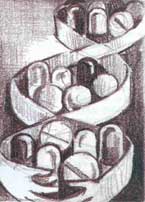Drug money
 THE US drug industry is in the grip of a "biotech fever". Drug giants are apparently scooping up shares in biotech companies. According to the latest reports, deals between pharmaceutical giants and biotech firms more than doubled in value over the past year. Affymax NV, the California-based biotech firm, for instance, has been approached by as many as 4 eager bidders for its novel but yet-to-be-proven drug discovery technology.
THE US drug industry is in the grip of a "biotech fever". Drug giants are apparently scooping up shares in biotech companies. According to the latest reports, deals between pharmaceutical giants and biotech firms more than doubled in value over the past year. Affymax NV, the California-based biotech firm, for instance, has been approached by as many as 4 eager bidders for its novel but yet-to-be-proven drug discovery technology.
The so-called "bio-brains" are bewildered by the sudden uncharacteristic attention being showered upon them. So far, the mainstream drugmakers -- who guard the treasury's medicine chest -- had been eyeing them with suspicion. No longer.
The drug companies are driven by the fear of being left behind by the new "dna generation". Gene-based analysis and computerisation are transforming biological research. Some time-honoured techniques of creating drugs are rapidly becoming obsolete, and manufacturers are desperately shopping for new methods. Among them are automated methods to make and screen millions of drug candidates in the timespan taken by a chemist using the old school-technique to process only a couple of them.
"This is a strategic redefinition of the pharmaceutical industry. They're walking away from the early-stage, inhouse research and relying heavily on small biotech companies," says Stelios Papadopoulos, managing director of the leading drug firm, PaineWebber Inc.
Of late, the performance of the r&d wings of the drug companies has been sluggish. According to the Wilkerson Group, a New York research firm, they are being increasingly dismissed as loss-making propositions. At the same time, pharmaceuticals are under pressure to come up with new products and technologies to attract consumers tired of duplicates being sold under different brand names.
The pharmaceutical-biotech deals are similar in most cases: the biotech partner contributes a proprietory technology in exchange for equity payment or research funding, with milestone payments based on key results in the clinic. In most cases, royalties and profit-sharing are given a backseat and are discussed only perfunctorily.
The arrangement seems to suit both parties. Striking a deal with Affymax, Glaxo got access to a disposable microchip filled with a million fragments of dna, which acts as a computerised test tube. The chip can reveal in a minute how an experimental drug might affect a gene carrying a particular disease, or a patient who is a carrier of that gene. And Affymax, on its part, is offered a comfortable financial cushioning.
Related Content
- Drug money destroying swaths of forest in Central America – study
- Rare diseases need our attention
- Private laboratory raided for overcharging of dengue rests
- Himachal plans to universalise healthcare
- Bring order to unregulated health markets
- National vaccine policy in the era of vaccines seeking diseases and governments seeking public private partnerships
